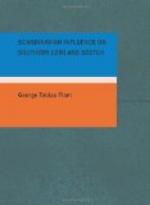We may conclude that the Scand. elements that had come into O.Eng. in the beginning of the 10th Century were not large. From the middle of the century they came in in large numbers, but the period of most extensive borrowing seems rather to be the last part of the 10th and the first half of the 11th Century. Wall suggests that the Dan. spoken by the Dan. settlers in England was of a more archaic kind than that spoken in Denmark—that this might in many cases account for the archaic character of the loanwords. We know that the settlements in central England were predominantly Dan. as opposed to Norse. The Scand. place-names as well as the character of the loanwords in the Ormulum indicate that. It is probable, then, that monophthongation took place later in the Dan. spoken in England than in that spoken in Denmark. The following is a list of some of these words found in Scotch. O.N. aei, Dan. e: bayt, to graze; blaik, to cleanse; graip, a fork; grane, a branch; graith, to prepare; laike, to play; slaik, to smoothen; lairing, gutter; the Yorkshire form lyring (Wall) seems to show an original monophthong. O.N. oey: careing, smaik. O.N. ou, Dan. oe: blout, bare; douff, dull; gowk, a fool; haugh, a knoll; loup, to run; louse, loose; nout, cattle; rowt, to roar; rowst, to cry out; stowp, a beaker; stour, a pole.
It will be seen from the above, leaving out of consideration the diphthong ou and ai, that the character of a large number of the loanwords is Norse. In a great many cases the E. and W. Scand. form of the word was the same. There are, however, a few words in Sco. that bear a Dan. stamp: sprent, donk and slonk exhibit E. Scand. non-assimilation of nt and nk to tt and kk. Snib corresponds to Dan. snibbe, cp. M.E. snibben. All these have the umlaut. Eng. snub, M.E. snubben and O.N. snubba have the unumlauted vowel. Bud agrees closer with Dan. bud, budh, than O.N. boeth, Norse bod. Thraive (Dunbar) and threave (Ramsay) both indicate an original a-vowel, hence correspond better to Dan. trave than O.N. þrefi. To these may be added bask, flegger and forjeskit, which are not found in W. Scand.
2. (a) THE OLD NORTHERN VOWELS IN THE LOANWORDS.
The values given in the following tables are for Middle Scotch. The symbols used do not need explanation:
SHORT VOWELS.
a.




